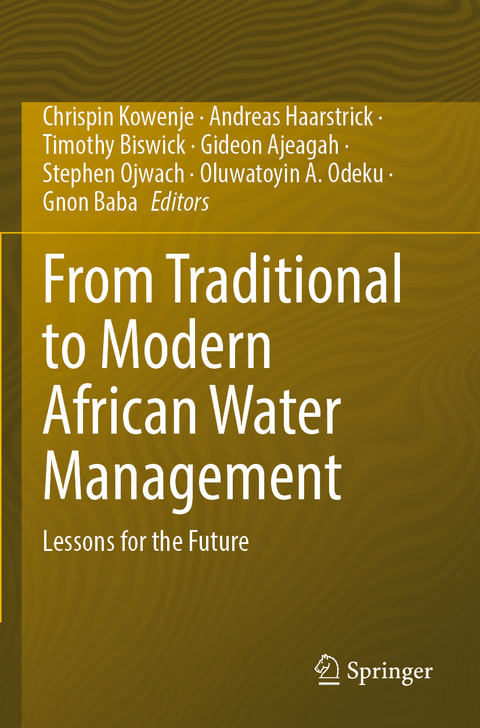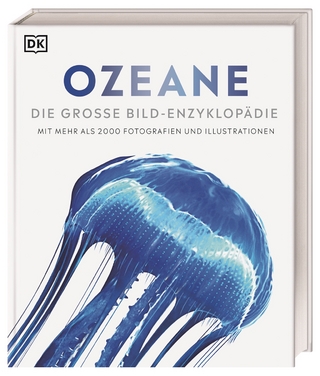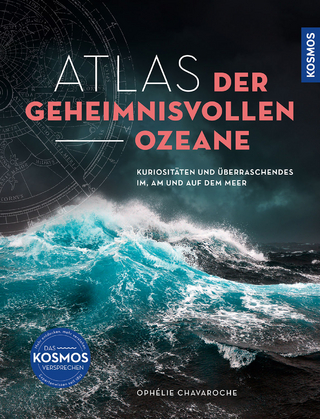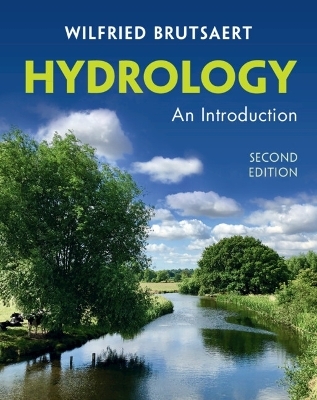
From Traditional to Modern African Water Management
Springer International Publishing (Verlag)
978-3-031-09665-5 (ISBN)
This book preserves and scientifically interprets the African foreknowledge on water resources management. It offers insight into the relevance of the traditional knowledge and practices to modern approaches on sustainable water management. The African continent has partially preserved its natural habitat for centuries. In this book, this knowledge is combined with the current scientific understanding. The traditional practices are categorized as: i) water harvesting, ii) water transportation, iii) water storage and conservation, iv) water treatments, v) myths and folk stories about water management or conservation, vi) water resource management systems, and vii) soil-water-forest conservation/management systems sub-topics. The findings presented here are in line with SDG 6, which aims at ensuring availability and sustainable management of water and sanitation for all by the year 2030.
lt;b>Chrispin Kowenje studied Chemistry at BSc and MSc levels from Egerton University - Kenya (1990-98) and received his doctorate in 2006 in the field of Chemistry of Materials at State University of New York at Binghamton University -USA. Since 2017, he is an Associate Professor of Chemistry at Maseno University. His teaching and research cover manipulating and applying the chemistry of zeolites, clays, and other natural materials for waste, domestic and drinking water treatments. He contributes to pollution remedial measures. In addition, Chrispin involves himself in optimizing bioenergy especially biodiesel, bioethanol, and biogas production processes. Prof. Kowenje has been a chairperson to Africa Future Earth committee (2019-2022), a member of the review board to global Future Earth organization (2020-2022) and member to Future Talent Council (2020). He has keen interest in how research scientists promote the attainment of Sustainable Development Goals.
Andreas Haarstrick studied Chemistry at the Technische Universität Braunschweig (1983-1989) and received his doctorate in 1992 in bioengineering. Since 2006, he is Professor for Bioprocess Engineering at the TU Braunschweig. His teaching and research cover modelling biological and chemical processes in heterogeneous systems, development of models predicting pollutant reduction in and emission behaviour of landfills, growth kinetics at low substrate concentrations under changing environmental conditions, Advanced Oxidation Processes (AOP), and groundwater management. Since 2012, he is the managing director of the DAAD exceed-Swindon Project dealing with sustainable water management in developing countries.
Timothy Biswick studied Chemistry and Mathematics at the University of Malawi (1993-1997) and received his doctorate in Materials Chemistry at the University of Cambridge (2006) specializing in organic-inorganic hybrid materials for various applications. Thereafter, he was a postdoctoral research fellow at the Centre for Intelligent Nano-Bio Materials in Seoul, Korea (2007-2008). Since 2008 he has been working in the Department of Chemistry at the University of Malawi. His teaching covers the general area of inorganic chemistry, and his research is centred on the design and synthesis of inorganic for environmental for environmental remediation. He is currently the Coordinator of the DAAD exceed-Swindon project for the Sub Saharan Africa region
Ajeagah Gideon Aghaindum is a full Professor of Hydrobiology, Environmental engineering and Public Health in the University of Yaounde 1(Cameroon). He is formerly adjunct Dean and now a Head of Division of Academic affairs, Admission and Research in the Faculty of Science, University of Yaounde 1,Cameroon.An international consultant in sustainable and ecosystemic exploitation of aquatic resources, environment and a public health expert.
Stephen Ojwach obtained his PhD degree in Inorganic Chemistry from the University of Johannesburg in 2008. He is currently a Professor of Inorganic Chemistry at the University of KwaZulu-Natal, South Africa and immediate former Assistant Dean & Head of School (Administration) in the School of Chemistry and Physics. Prof Ojwach has also been a visiting research professor at various universities; University of Lethbridge (Canada), RTWH Aachen University (Germany), Moi University (Kenya) and Technical University of Kaiserslautern (Germany). His main research focus is onApplied Organometallic Chemistry and catalysis, but also has collaborative projects on Bioinorganic Chemistry and Environmental chemistry. Prof Ojwach is a recipient of several research grants such as DST-NRF Center of Excellence in catalysis (c*change) and NRF-competitive program for researchers (SA), International Foundation for Science (IFS), Third World Academy of Science (TWAS). He has also received several accolades including Top Young Researcher (University
Sub-Saharan Africa´s Way of Water Management.- Water harvesting Practices and Consequences in South of Togo: Case of Mission TOVÉ and KOVIÉ in Maritime region.- Traditional Water Conservation Practices in Rural Areas of TEM Land, TOGO.- Traditional Methods of Water Conservation and Management in BASSAR and KABYE Land, TOGO: Comparative studies.- Traditional and Modern Methods of Water Conservation in MALAWI.- Approaches to Water Conservation in Coastal Communities in Southern GHANA.- Water Resources Harvesting and Storage Methods in Cameroon: Physico-Chemistry and Health Implication.- Assessment of Treatment Methods used for the Pollutants Removal from Water in BURKINA FASO: Review and Current Challenges.- The Use of Plants for Drinking Water Disinfection: Traditional Knowledge, Scientific Validation, Current Challenges and Prospects for the Future.- Efficiency of Indigenous Water Treatment Methods in Rural Communities in Northern GHANA.- Traditional Water Purification Methods among the Luo and Luhya Communities of KENYA.- Traditional Beliefs and Healing Potential of the Osun River: Quest for Indigenous Water Management Approaches in Osogbo, Southwestern NIGERIA.- Indigenous Knowledge and Practices for Sustainable Water Resources Management: A Case of Luo and Banyala in KENYA.- Indigenous Approaches to Domestic Water Catchment Management and Conservation in SOUTHERN AFRICA.- From Huts to Shacks: Drawing Lessons from Traditional Resource Management Systems to inform the Management of Communal Water Projects Urban Informal Settlements in KENYA.- Water Management and Treatment Practices in the Akparé District Plateau Region of TOGO.- Water Conservation Techniques in Ilukuno, Ikun-Amure and Ijan Ekiti Communities in Ekiti State, NIGERIA.- Irrigation Practices in Farming Communities in North Central NIGERIA.- Influence of Water Salinity on the Evolution from Traditional to Modern Water Collection Methods in CAMEROON'S Coastal Areas: Use of Ciliated Protozoans as Water Quality Indicators.- Traditional Methods of Agricultural Water Resource Management in SOUTHERN AFRICA.
| Erscheinungsdatum | 17.10.2023 |
|---|---|
| Zusatzinfo | XVIII, 288 p. 127 illus., 110 illus. in color. |
| Verlagsort | Cham |
| Sprache | englisch |
| Maße | 155 x 235 mm |
| Gewicht | 474 g |
| Themenwelt | Naturwissenschaften ► Geowissenschaften ► Hydrologie / Ozeanografie |
| Schlagworte | Agricultural water management • Climate change impacts • Sustainable water management • Wastewater Treatment Methods • water quality • water scarcity |
| ISBN-10 | 3-031-09665-7 / 3031096657 |
| ISBN-13 | 978-3-031-09665-5 / 9783031096655 |
| Zustand | Neuware |
| Haben Sie eine Frage zum Produkt? |
aus dem Bereich


